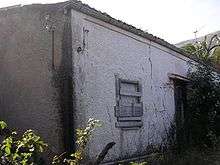Abbey of Thelema

| Thelema Category:Thelema |
|---|
 |
| Core topics |
| Mysticism |
| Thelemic texts |
|
| Organizations |
| Deities |
| Related topics |
The Abbey of Thelema refers to a small house which was used as a temple and spiritual centre founded by Aleister Crowley and Leah Hirsig in Cefalù (Sicily, Italy) in 1920.[1]
Name
The name was borrowed from François Rabelais's satire Gargantua and Pantagruel,[2] where an Abbaye de Thélème is described as a sort of "anti-monastery" where the lives of the inhabitants were "spent not in laws, statutes, or rules, but according to their own free will and pleasure."[3]
Objectives
This idealistic utopia was to be the model of Crowley's commune, while also being a type of magical school, giving it the designation "Collegium ad Spiritum Sanctum", A College towards the Holy Spirit. The general program was in line with the A∴A∴ course of training, and included daily adorations to the sun, a study of Crowley's writings, regular yogic and ritual practices (which were to be recorded), as well as general domestic labor. The object was for students to devote themselves to the Great Work of discovering and manifesting their True Will.
Crowley had planned to transform the small house into a global center of magical devotion and perhaps to gain tuition fees paid by acolytes seeking training in the Magical Arts; these fees would further assist him in his efforts to promulgate Thelema and publish his manuscripts.
Raoul Loveday
In 1923 a 23-year-old Oxford undergraduate by the name of Raoul Loveday (or Frederick Charles Loveday) died at the Abbey. His wife, Betty May, variously blamed the death on his participation in one of Crowley's rituals (allegedly incorporating the consumption of the blood of a sacrificed cat) or the more probable diagnosis of acute enteric fever contracted by drinking from a mountain spring. (Crowley had warned the couple against drinking the water, as reported in biographies by Lawrence Sutin, Richard Kaczynski and others.) When May returned to London, she gave an interview to a tabloid paper, The Sunday Express, which included her story in its ongoing attacks on Crowley. With these and similar rumors about activities at the Abbey in mind, Benito Mussolini's government demanded that Crowley leave the country in 1923.[4] After Crowley's departure, the Abbey of Thelema was eventually abandoned and local residents whitewashed over Crowley's murals.
Current status and popular culture
The villa still stands today, but in poor condition. Filmmaker Kenneth Anger, himself a devotee of Crowley, later uncovered and filmed some of its murals in his film Thelema Abbey (1955), now considered a lost film. Recently, other murals were uncovered, and pictures of them were posted on the Internet. "Abbey of Thelema" remains a popular name for various magical societies, Witchcraft covens, and Satanist grottoes.
Danish artist Joachim Koester created five colour and five black and white photographs of the villa; these photographs comprise his ‘Morning of the Magicians’ (2005) work.[5]
Kenneth Anger revisited the Abbey in 2007, 52 years after his 1955 visit, and made a short video which can be found as an "extra" on the "Anger Me" DVD.
Notes
- ↑ Sutin, Do What Thou Wilt, p. 279
- ↑ Colin Wilson, Nature of the Beast, p. 73
- ↑ Rabelais, F. Gargantua and Pantagruel, Ch. 1.
- ↑ The well-known Sicilian Novelist, Leonardo Sciascia, has an amusing short story about Crowley's expulsion from Sicily. Magical Diaries of Aleister Crowley, page 13
- ↑ http://www.moma.org/collection/artists/35288?locale=en
External links
- Thélema Abbey - Official website from Sicily
- Photos of the Abbey from 2005
- Abbey of Thelema movie on IMDB
- Photos from cefalù
- "No resurrection without psychoplastic re-shape". An article by the Austrian Philosopher Andreas L. Hofbauer about the Abbey, original pictures of the replica of the Chambre des Cauchemars by the artist René Luckhardt and about ritual chambers in general
Coordinates: 38°01′54″N 14°01′38″E / 38.031635°N 14.027127°E